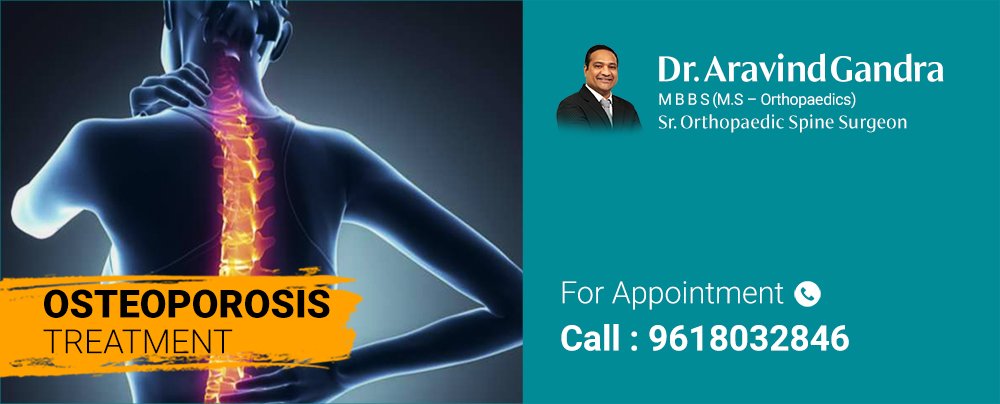Osteoporosis Treatment

Osteoporosis is a condition characterized by weak and brittle bones, making them susceptible to fractures even with minimal stress. It primarily affects the hips, spine, and wrists. Osteoporosis reduces bone strength by decreasing the levels of calcium, phosphorus, and other essential minerals necessary for healthy bones.
While osteoporosis is more commonly observed in women, it can also affect men. Women who have reached the post-menopausal stage are particularly at a higher risk. Studies indicate that white and Asian women face an increased risk of developing osteoporosis. To maintain optimal bone strength, regular exercise and adequate intake of calcium and vitamin D are crucial factors to consider.
Osteoporosis – Symptoms
Osteoporosis is a condition characterized by weak and brittle bones, but it often does not cause noticeable symptoms in its early stages. As the condition progresses, the following symptoms may become apparent:
• Bone pain
• Fractures
• Loss of height
• Back pain
• Weakened grip strength
It is important to note that some individuals may not experience any symptoms until a fracture occurs. Therefore, osteoporosis is often referred to as a “silent disease.” Regular bone density screenings and evaluation by a healthcare professional are crucial for early detection and appropriate management of osteoporosis.
Osteoporosis – Causes
Osteoporosis is primarily caused by an imbalance between the production of new bone tissue and the removal of old bone tissue. Several factors contribute to this imbalance, leading to a decrease in bone density and an increased risk of fractures. The main causes of osteoporosis include:
1. Aging: As people age, their bones naturally become less dense and weaker. The rate at which bone tissue is lost becomes faster than the rate of new bone formation, resulting in reduced bone density.
2. Hormonal changes: Hormonal changes play a significant role in bone health. Women experience a decrease in estrogen levels during menopause, leading to accelerated bone loss and an increased risk of osteoporosis. In men, a decrease in testosterone levels with age can also contribute to bone loss.
3. Lack of calcium and vitamin D: Adequate intake of calcium and vitamin D is essential for maintaining strong and healthy bones. Insufficient levels of these nutrients in the diet can lead to reduced bone density and an increased risk of osteoporosis.
4. Lifestyle factors: Certain lifestyle habits can increase the risk of developing osteoporosis. These include a sedentary lifestyle, lack of weight-bearing exercise, smoking, excessive alcohol consumption, and a diet low in nutrients essential for bone health.
5. Medical conditions and medications: Some medical conditions and medications can contribute to bone loss and increase the risk of osteoporosis. These include hormonal disorders (such as hyperthyroidism), gastrointestinal disorders (such as celiac disease), rheumatoid arthritis, certain cancer treatments (such as chemotherapy and hormonal therapies), and long-term use of certain medications like corticosteroids.
6. Family history and genetics: Osteoporosis tends to run in families, indicating a genetic component. If a close family member has osteoporosis or has experienced fractures due to weakened bones, it increases an individual’s risk of developing the condition.
Understanding these causes can help individuals take preventive measures and adopt a lifestyle that promotes bone health. It is important to consult with a healthcare professional for proper evaluation, diagnosis, and guidance on managing osteoporosis.
Osteoporosis – Treatment
Dr. Aaravind Gandra is a highly esteemed specialist in Hyderabad who provides exceptional treatment options for osteoporosis. With his extensive expertise and experience in the field, Dr. Gandra offers comprehensive and personalized care to patients with osteoporosis. He understands the impact of this condition on bone health and overall well-being and is dedicated to providing effective treatment strategies.
Dr.Gandra’s approach to osteoporosis treatment focuses on slowing down bone loss, reducing the risk of fractures, and improving bone density. He stays updated with the latest advancements in osteoporosis management and utilizes evidence-based practices to offer the most appropriate and advanced treatment options to his patients.
Depending on the individual’s needs and medical history, Dr. Aaravind Gandra may recommend a combination of treatments. These may include medications to slow bone loss, promote bone formation, and increase bone density. He also emphasizes the importance of lifestyle modifications such as regular weight-bearing exercises, adequate calcium and vitamin D intake, and smoking cessation.
With his compassionate care and dedication to patient well-being, Dr. Aaravind Gandra is a trusted provider of osteoporosis treatment in Hyderabad. Patients can rely on his expertise to receive the best possible care and support in managing their condition, ultimately improving their bone health and quality of life.
